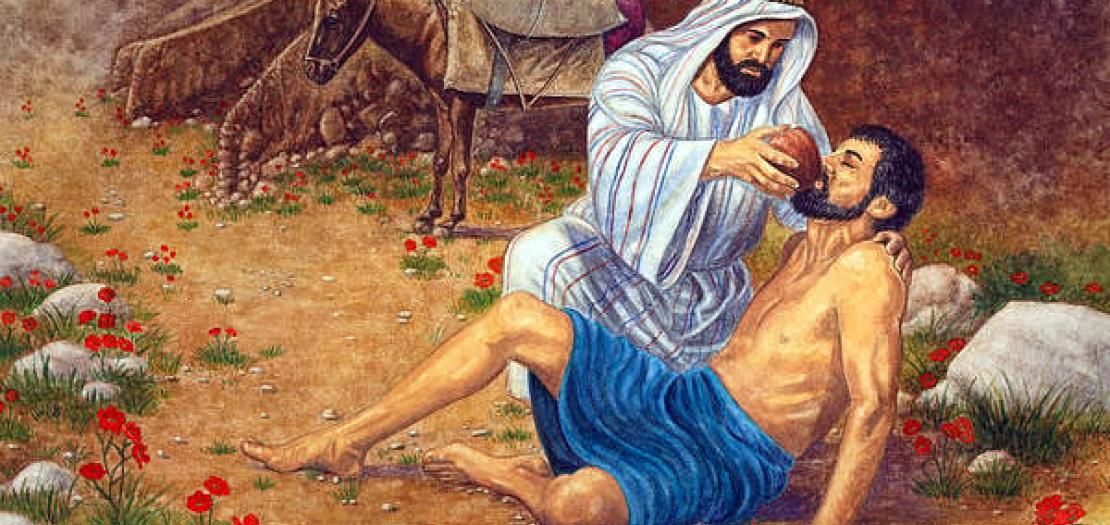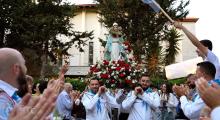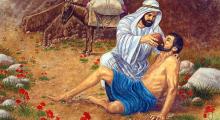Issued by the Catholic Center for Studies and Media - Jordan. Editor-in-chief Fr. Rif'at Bader - موقع أبونا abouna.org

Following is the text of Latin Patriarchof Jerusalem Cardinal Pierbattiasta Pizzaballa's meditation on the 15th Sunday of Ordinary time, dated July 13, 2025:
The parable of the “Good Samaritan” that we hear today is embedded in the dialog between Jesus and a scribe (Luke 10:25-37) who wants to put him to the test.
The scribe’s question is an important one, the same question that every disciple asks his teacher.
But his attitude is not sincere, is not that of a good disciple: he is not so much looking for an answer as trying to embarrass his interlocutor, to discredit him. The doctor of the Law asks: “Teacher, what must I do to inherit eternal life?” (Luke 10:25)
Jesus responds to this one, important question with two questions that are also fundamental: “What is written in the law? How do you read it?” (Luke 10:26)
It is important to keep these two questions together. The complete answer to the doctor of the Law can only be found by holding these two questions of Jesus together. One must indeed know what is written in the Law, what God has revealed about eternal life. But one must also know how to read it, with which heart, with which eye.
The doctor indeed knows the Law well and answers it correctly. But he doesn’t seem to fully understand what it means, how to interpret it. It is the look of someone who wants to justify himself (“But because he wished to justify himself, he said to Jesus...” (Luke 10:29)
The scribe’s answer to Jesus is another important passage: “And who is my neighbor?”. The parable is the answer to both of the scribe’s questions.
The passage is quite familiar. A man on his way from Jerusalem to Jericho encounters robbers who beat him and leave him half dead. (Luke 10:30) So death is already halfway there.
And it depends on the continuation of the story, on the people we meet, whether death can take its full course or whether it is pushed back.
If it depended only on a priest who happens to be passing by, death could take its full course and take the whole life of the poor unfortunate man. For he sees the half-dead man in the street, but passes by. He does nothing bad or even good. He simply walks away, just like the robbers did after they had beaten the poor man. (“A priest happened to be going down that road, but when he saw him, he passed by on the opposite side”. (Luke10:31) The same applies to the second figure on the road, the Levite. He also acts like the priest: he sees him and passes by. (Luke 10:32)
What changes the course of the story is a small word that introduces the last figure on the road: instead, but (“But a Samaritan...” (Luke 10:33)
Everyone does the same thing, and death can take its course. But someone else does not simply do what oth-ers do in order to justify himself, (cf. Luke 10:29) perhaps precisely because everyone else has already done it.
The Samaritan also sees like the first two. But something is different with him. He was moved by what he saw. He had a different view of what was happening to the man, and it touched him inwardly. He is moved with compassion (“But a Samaritan traveler who came upon him was moved with compassion at the sight of him”. (Luke 10:33)
The Samaritan does not blame those who caused this devastation, he does not condemn those who did not stop before him to save this man. He simply does everything in his power: he takes care of him (“He approached the victim, poured oil and wine over his wounds and bandaged them. Then he lifted him up on his own animal, took him to an inn and cared for him”. (Luke 10:34)
Of this care, which consists of concrete gestures full of tenderness, we emphasize only one element. The Sa-maritan rescues the dying man with oil and wine, loads him onto his mount and entrusts him to an innkeeper, spending money on him. But he also gives him something much more valuable - that which is most valuable to us - namely his own time.
In fact, his care is not a temporary feeling, not a momentary rush, but extends over a longer period of time: it continues the next day, and he looks ahead to his next return (“The next day he took out two silver coins and gave them to the innkeeper with the instruction: ‘Take care of him. If you spend more than what I have given you, I shall repay you on my way back”. (Luke 10:35)
At the end of the parable, Jesus in turn asks the doctor of the Law a question, turning the doctor's initial ques-tion on its head. Not who is my neighbor (“Who is my neighbor?”), but who “became a neighbor to the man who fell into the hands of robbers?” (Luke 10:36)
The priest and the Levite certainly knew what was written in the law and what was required of them, but their lives were not really shaped by what they knew. The Samaritan’s life, on the other hand, was shaped by the Law, and that is why he was compelled to stand up for this poor man and not allow death.
This is Jesus’ answer to the original question of how to inherit eternal life.
+ Pierbattista







